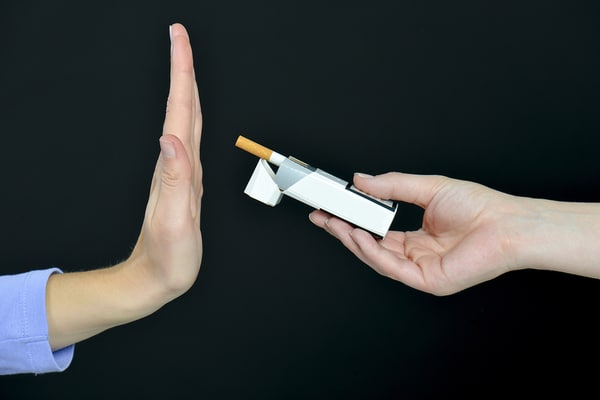People suffering from addiction come from all walks of life. They may come from different social groups, different educational and religious backgrounds, and different family environments. But there is something that 92 percent of all people in chemical dependency treatment programs have in common: smoking.
According to information from the New York Office of Alcoholism and Substance Abuse Services, 92 percent of those in alcohol or drug abuse treatment are also smokers. Comparatively, only about 18 percent of people among the general population are smokers.

92 percent of people in treatment for addiction are also smokers.
Research supports the correlation between substance abuse and smoking. Specifically, the National Institute on Alcohol Abuse and Alcoholism reports that between 80 and 95 percent of alcoholics smoke regularly, and nearly 70 percent are considered heavy smokers because they smoke more than one pack of cigarettes per day. This is statistically significant, but does it really matter if you smoke in rehab?
Why Smoking Is Serious
Consider this: This Hazelden report quotes Richard D. Hurt, MD, Head of the Nicotine Dependence Center at Mayo Clinic, as saying:
“For patients who have been through addictions treatment, half of their deaths will come from tobacco, while one-third will come from alcohol-related causes.”
Then there is this startling statement from the Substance Abuse and Mental Health Services Administration (SAMHSA):
“Smoking tobacco causes more deaths among clients in substance abuse treatment than the alcohol or drug use that brings them to treatment.”
SAMHSA also reports that, in a study of 845 people who had been treated for addiction, 51 percent of deaths were attributed to tobacco-related causes. That is twice the rate found in the general population, and nearly 1.5 times the rate of death by other addiction-related causes.
Smoking Stifles Alcohol and Drug Abuse Recovery
There was once a belief that encouraging someone in an alcohol or drug abuse treatment program to stop smoking while in treatment was not a good idea. The road to recovery from addiction to drugs and alcohol is tough, and many once felt that adding the difficulty of nicotine withdrawal would make that journey even harder. If you are a smoker in alcohol or drug rehab, you might feel the same way. But here is some good news: Kicking your smoking habit while recovering from addiction is both possible and beneficial.
Research now indicates that cigarettes act as a gateway drug to other addictive substances. Smoking, then, actually increases the likelihood that you will suffer setbacks on your journey to recovery.
Additionally, quitting tobacco use can help you overcome other addictions as well. Why is that the case? Nicotine has the effect of suppressing your emotions, which is one of the reasons smokers automatically reach for a smoke when they are under stress. Much like alcoholics who need a drink to “take the edge off,” smokers find a certain amount of solace in smoking.
However, as you may be learning in your drug treatment program, one of the best ways to beat addiction once and for all is to get in touch with your emotions, not to dull them with a chemical substance. When you understand and address your true emotional state, you will find the strength you need to stop all forms of addiction in your life. In other words, you will be free.

Harris House can help you gain the strength to resist the urge to smoke.
We’re Here to Help
Harris House can help you find freedom from alcohol and drug abuse, and we can also work with you to address nicotine addiction. Contact us today to take the first step on your road to freedom from all forms of addiction. You can do this. We can help.








